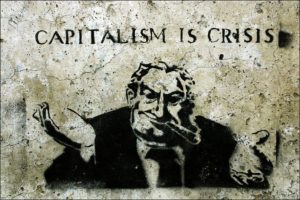In a single week in March 2019, Americans were treated to an unprecedented college admission bribery scandal, the lenient sentencing of Trump’s campaign manager on tax evasion, and Republican plans to cut the pensions of thousands of federal employees, accompanied by proposed decreases in Medicare and Medicaid budgets.

These sad events touched the power centers of American society: the benefits of wealth and privilege, a tilted judicial system, and how fostering retirement insecurity for millions of workers further destabilizes the middle class. All these crimes are happening in the world’s wealthiest and most industrialized nation.
The events of this week were a flagrant showcase of abuses. On display were the excesses of what white-collar criminals can get away with, of unregulated, monopoly capitalism that produced a society vividly skewed to the wealthy and politically favored and those who can throw sand in the eyes of justice.
As noted in an earlier article on a similar topic on this site, Americans have an odd fascination with wealth. Most are not sure how vast amounts of money are accumulated. When it happens to someone, it generates a mysterious fascination about how much luck, personal connections, or esoteric knowledge could be bestowed on one person and not another.
When people see others with vast wealth, it can also raise some weighty introspection. Why them and not me? What did I do wrong? Or is there something they know that I don’t?
Nowadays, people can ask how that family’s child got admitted to that top school when mine did not. These questions have a life since students share their college testing scores and grades. By social osmosis, classmates know how they stand about one another.
Jared Kushner’s father gave Harvard $2.5 million donation at about the same time his son was admitted to that school. Maybe it was a coincidence. Similarly, Donald Trump Jr. was admitted to the University of Pennsylvania after his father gave the college at least $1.5 million.
These may be coincidences. But, as they say in the intelligence community, coincidences require a lot of planning. Trump himself was admitted to the University of Pennsylvania, never graduated, and then had his grades, and later his tax returns, sealed from public scrutiny.
Moving back to the present, we see that not much has changed. Among the 50 people cited in the college admissions scandal are Douglas Hodge, former chief executive of Pimco, one of the world’s most prominent bond fund managers. In 2013, Hodge’s annual salary was $45 million. Also charged was William E. McGlashan Jr., a senior executive at TPG, one of the world’s biggest private equity firms. McGlashan is a graduate of Yale and Stanford. And since this is about money and privilege, the scheme was also tax deductible since the scam creator funneled the payments through his charity.
So, while this scandal is one everyone can relate to, it also bolsters the belief that the system is very broken.
Unregulated Capitalism on Trial
News of public corruption in governments worldwide, combined with the unprecedented wealth gap, burdensome tuition loans, and constant pressures of consumerism, has soured many people on the current economic system.
This explains the results of surveys cited in the publication Foreign Policy, which found:
“According to an April 2016 Harvard University poll, support for capitalism is at a historic low. Fifty-one percent of Americans in this age cohort reject it, while 42 percent support it. Thirty-three percent say they support socialism. The Harvard poll echoes a 2012 Pew survey, in which 46 percent of 18- to 29-year-olds had a positive view of capitalism and 47 percent a negative one. While older generations had a slightly more positive take on capitalism — topping out at 52 percent for the oldest cohort, citizens over 65 — youth had a markedly different take on socialism. Forty-nine percent viewed it positively, compared to just 13 percent of those 65 or older.”
So, how will the Mueller investigation affect these survey results?
We’ll undoubtedly wait, but the bottom line is that the Mueller investigation will indict not only Trump and his family but also an entire economic system. No wonder people are looking for new financial alternatives. If this version of unregulated capitalism produced Trump and the unearned status and privilege of him and his family, what hope is there for the average citizen without access to the privilege money can buy?
The inequalities caused by the two ways of life—excess privilege for white-collar criminals and restricted access to the fruits of capitalism–do not result in an economically, judicially, or socially just society. Closing this gap will have a significant social and political cost, but the process may just be beginning.











